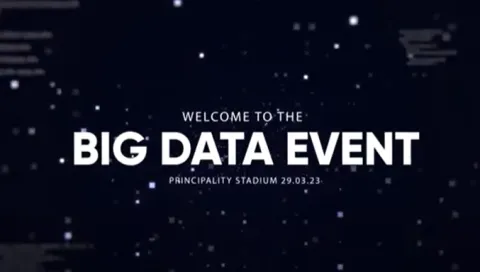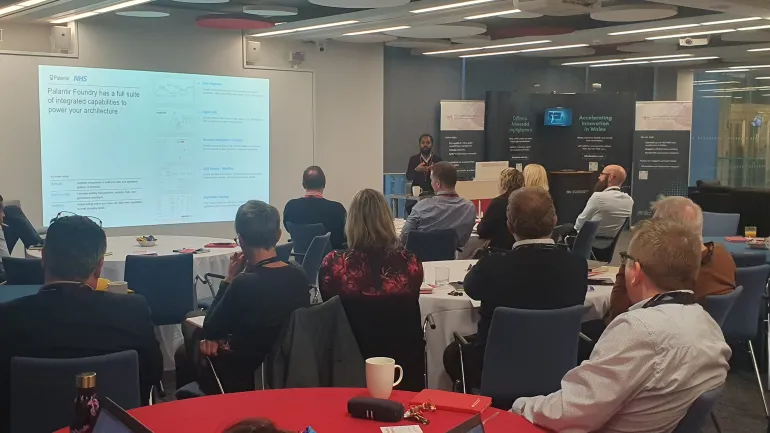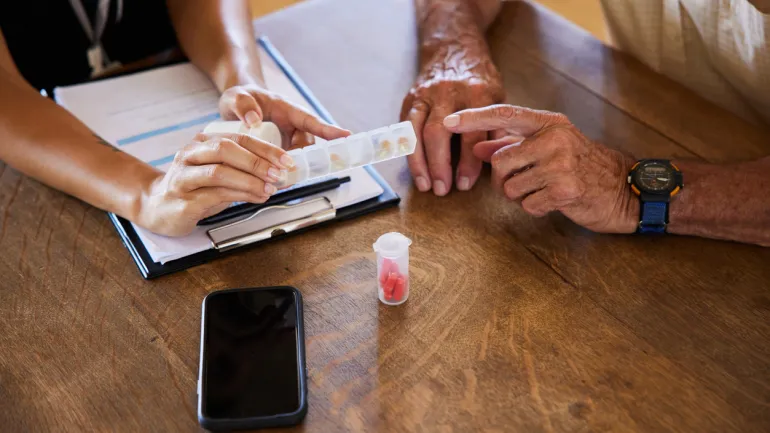Our Big Data Event, delivered in partnership with Digital Health Ecosystem Wales, The National Data Resource and Advanced Analytics, was a fantastic opportunity to hear powerful evidence of data integration transforming health and social care, practical advice on using data in our everyday work, and inspiration on how to think differently about data.

Big data is a hot topic across health and social care, and understandably so. We’re already witnessing the incredible impact of data being used to transform processes in healthcare, creating dashboards of real-time information that are enabling care teams to implement health solutions at home, and streamlining services to deliver care where it is most needed.
On 29 March 2023, we gathered some of the leading figures using data in Wales’ Principality Stadium for our Big Data Event in partnership with The National Data Resource and Advanced Analytics. Throughout the day, we heard how to apply big data in practice to overcome challenges and create solutions within health and social care.
This ranged from identifying a relationship between local air pollution levels and people admitted to A&E with respiratory complications, to using Google Cloud as a platform for optometry clinicians to identify best practice and consequently reducing hospital admissions by 55%.
I noticed three strong themes that were consistent across the day:
- Maintaining a people-centred approach
- A need to clearly identify the challenges around adoption of effective data-driven solutions
- The importance of prioritising issues we are facing, taking small steps to learn and adapt which will fuel larger changes within the health and social care sector.
Data is a numbers game with people at the heart.
Alison Knight, Privacy Specialist (Data and AI) for the Health Research Authority, reminded us that data always has a people-centred purpose. We therefore need to be investing our time in high-quality research that drives high-impact results. The outcome of this is twofold. Firstly, we achieve solutions that can have a long-lasting impact but, secondly, we build trust with the nation that our research works.
Fundamentally, data is a story of people’s lives as a narrative of events recorded statistically. Sensitivity is needed, and we’ve a responsibility to openly communicate with patients and service users about how we’ll use their data – bringing them on the journey with us.
Dr Zoe Webster, Director of Data and AI Solutions at BT, says that we need to know who is impacted by data-driven decisions as this influences how we use data and our communication strategy. We need to tailor transparent information to all affected, be it clinicians, patients, servicer users, or communities, without diluting the message we’re sharing. This lets us build trust with the nation as we improve the systems that benefit them.
Challenges are a catalyst for collaboration.
Collaboration is important but doing it in practice can prove challenging. Covid-19 let us work in partnership by bringing together leaders and data experts. Emerging from this is a key lesson: we need to identify the problem to catalyse collaboration. Knowing what we are using data for automatically gives it meaning.
Mike Emery, Welsh Government’s Chief Digital and Innovation Officer for Health and Social Care, reminded us that in doing this, we begin to understand what data we need and how to use it as a tool for early intervention and prevention. We can predict future health challenges, implement solutions to avoid exacerbation of current issues, and help to address health inequalities. Presently, we have lots of data at our disposal with no clear knowledge of what to do with it. Identifying the exact challenge we face helps us we know which data sets to bring into our problem solving.
However, data can’t solve its own problems. Mike Emery further advocated that we need to create a data-driven infrastructure and ensure we have the right people in the room interpreting the data with our key leaders.
The panel discussion, led by Louisa Nolan, Public Health Wales, further elaborated on key points throughout the day. In attendance were Linda Prosser, Executive Director of Strategy and Transformation at Cwm Taf Morgannwg University Health Board Sitting and Duncan Robertson, Assistant Director of Clinical Development at Widening Access to Speciality Training who both emphasized the need to be ambitious with embracing data, with colleagues being activists in their field for creating the change. Additionally, Ifan Evans, Executive Director of Strategy at Digital Health and Care Wales, advocated for sharper design to improve user experience so that leaders and practitioners can easily get the right information at the right time. Data doesn’t have to be complicated – and if it isn’t, our practitioners and leaders will already possess the skills needed to work with it.
Small steps amount to big changes.
During the panel session, Rhidian Hurle, Medical Director at Digital Health and Care Wales, reminded us that transformation arises from many small, consistent changes. Doing this builds a strong, steady foundation of data-driven change and upholds a data-driven environment.
It also means we can discern good quality data and better understand which dataset to use, as explained by Professor Jeremy Wyatt, Emeritus Professor of Digital Healthcare at the University of Southampton. We can understand new ways of working, standard processes and provide universal systems for using, interpreting, and implementing data.
The Big Data Event was a small contribution that could lead to big changes by inspiring leaders across health and social care and encouraging collaboration. The event let decision makers honestly explore concerns and barriers and, identify what is needed to move forward.
The biggest inspiration from the day was knowing that harnessing data for solutions is already happening and, being optimistic based on the evidence from the event, our health and social care sectors hold much potential to change rapidly in the coming years.
The National Data Resource (NDR) programme is a strategic initiative, helping to transform health and care in Wales by driving collaborative use of data. Read more about their impact and stay up to date with the latest news by visiting the NDR website.



